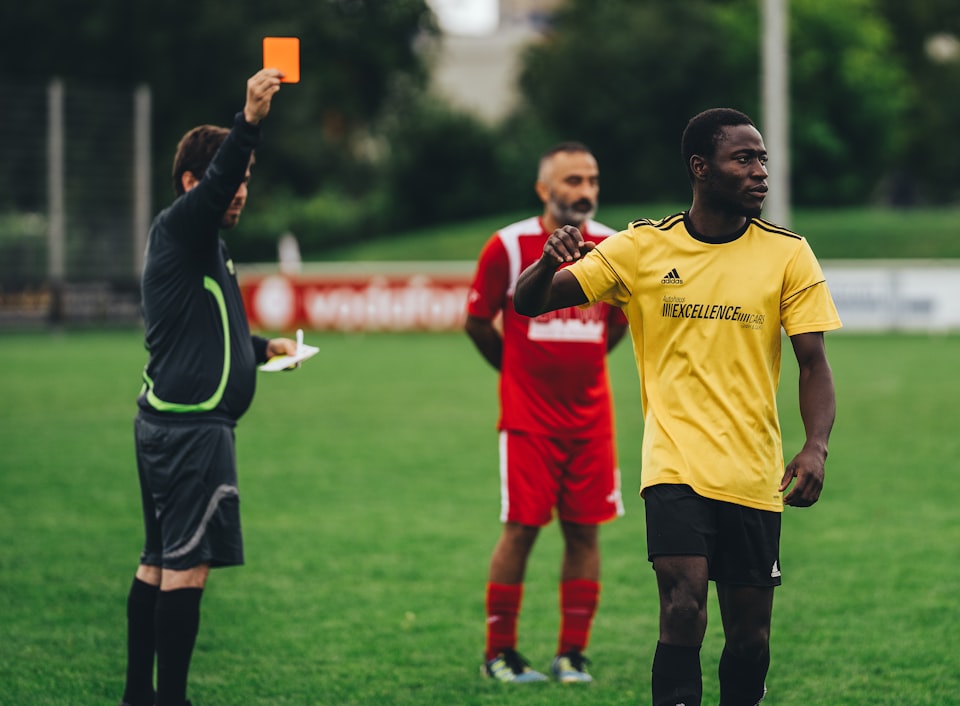Mark Schlereth played offensive line at the University of Idaho, and later started 140 games for the Washington franchise and Denver Broncos of the NFL. He’s known for a few things. Schlereth would often piss himself on the field rather than take a constitutional trot to the locker room, earning the king of all offensive lineman nicknames, “Stink.” Scherleth endured 29 surgeries during his pro career including 20 on his knees alone, made Arnold Schwarzenegger look small when he met him in person, and wore the number 69 before the number universally represented niceness. <—A MEME PIONEER
These achievements all inflate his already considerable aggregate offensive lineman-ness score. But nothing, absolutely nothing is more football about Schlereth’s most football guy asset. Before games towards the end of his career, Mark Schlereth, professional lineman, would walk up to the referee, smile, and say:
“I am going to hold on every play. It’s up to you when you want to call it.”
That wiggle room between the rule and reality is all that allows football, a track meet held in the middle of a bar brawl, to function. Holding could be called on every play. Pass interference could easily be called on half of all plays. All referees, at their best, write traffic tickets in the middle of the Indy 500 on every snap.
So it feels even weirder than usual to see football referees in the highest league in the land call roughing the passer like this:
refs called this roughing the passer on 3rd down and i genuinely do not know what Grady Jarrett could have done differently pic.twitter.com/VX6i0UpJiL
— Christian D'Andrea (@TrainIsland) October 9, 2022
WTH IS HE SUPPOSED TO DO pic.twitter.com/23hSXtL65a
— Warren Sharp (@SharpFootball) October 11, 2022
To get the boring factuals out of the way: Yes, the NFL asked their officials to emphasize roughing the passer calls this year. Yes, protecting all players including the quarterback remains an important priority, and the rule is at root a good one. Yes, it’s a rule, and some dullard will read it back to you like they’re making a point.
The patent absurdity of either call shown here stretches the already tight bounds of football’s baseline, usual levels of absurdity. Grady Jarrett clearly rolls Brady to the ground, but does so with a clear lack of malice or intent. Chris Jones’ penalty is even more insane, since Jones a.) strip-sacks and recovers the ball from Carr on the way down, and becomes the ball carrier and not a defender at that point, and b.) Jones clearly braces himself on the way down somehow to avoid landing his whole body weight on Carr.
(Note: Chris Jones did all of this on a single play in the span of about three seconds. Professional athletes are not normal, not at all. )
The refs, in the language of the biggest tools you know, “have” to call this at a point of emphasis. That kind of dead hand reckoning and mandatory minimum officiating reduces officials to robots, and like most automated processes encourages the kind of absurdity only automated results can deliver.
All of this would be a lot easier if referees had some way of governing player conduct that didn’t rely on an instantaneous, exact, and inevitably disastrous implementation of overly legalistic rules governing an anarchic sport. A way of saying "hey, that’s not specifically a violation of this rule, but it’s close and I need you to watch it,” or maybe past that “I’m going to take you off the field after repeated documented warnings.” A way no one has ever suggested before, much less used in other sports around the world.
It’s time to give football referees yellow and red cards. It’s that simple. Why, you may ask, should we embrace sports communism and move away from healthy, red-blooded American fake sports law? I’m so glad you asked, imaginary person.
One: Officiating’s fake-ass legalese is one of a thousand things making football games too long, and not one person in the universe likes it. Keeping the game moving is one reason for streamlining the enforcement of the rules. Basic procedural penalties like offsides, false starts, and holding stay the same. We don’t even have to present them to the crowd on a live mic. No one cares. Just call them, move, and get the game going. (That's why, in the language of every other sport in the world, they would be called minor infractions, rather than treating every infraction with the same attention like football does.)
What will be losing by doing this? Well, the good chunk of the game where we watch this poor man try to talk that fake-ass law in front of 50,000 roaring and extremely pissed people:
That’s Carl Cheffers, the ref whose voice cracked when he made his next call following Chris Jones’ penalty against the Raiders. I shouldn’t know who Carl Cheffers is, much less spend more than thirty seconds seeing him do anything during a football game. I spend a ridiculous amount of time watching referees talk. I don’t want to see them. I don’t want to know their names, or hear the sound of their voices.
Two: A card system gives a referee options and flexibility. I feel this, just as much as I certainly don’t want to listen to a bad one get deeply shook by the blood rage of a stadium full of football fans, or watch him get pelted with beer cans after making a horrendous call he had no call but to make on orders from his bosses.
To keep the game safe, fast, and semi-sensical, referees need options in how to control a game. Yes, even inept referees.
Maybe especially for inept referees, actually. Take poor Carl, for instance: Cheffers might be incompetent, but at least under a card system he might have real options instead of instantly levying a fifteen yard penalty and automatic first down on the play. He can botch those, too, but at least a card on the player emphasizes in-game technique and behavior with the potential consequence of taking away the one thing a player values more than anything else: Being on the field.
Three: A card system places emphasis on player responsibility when it comes to conduct penalties. Penalties like the ones called on Grady Jarrett and Chris Jones end up as individual cards, not team disasters without hope of collective recovery. Furthermore, the most extreme penalties for hits can be saved for the most egregious plays, and not automatically triggered by hits like Jones' or Jarrett’s, both clearly not delivered with anything close to real malice.
One important note also worth mentioning here: A lot of dangerous but still legal things in football badly need the potential restraint of a yellow card/red card enforcement system, and the warnings leading up to them. See: Whipping a QB down, like the completely legal hit Tua Tagovailoa took a few weeks ago against the Bengals to give him his first official concussion, or other totally legal but still dodgy/unsportsmanlike actions leading to worse trouble down the road.
TL;DR: Just because it’s not explicitly against the rules doesn’t mean it’s something the game needs, or that a ref wants happening on the field. The ref’s job is to control the game, and they should have everything necessary to make that happen in a speedy, simple, and expedient way.
Four: A card system works, and has worked in other equally brutal sports before. One might say: But this ain’t soccer! Fine, I’m not suggesting we wholesale import soccer’s card-based system of penalties. I’m suggesting we instead wholesale rip off rugby’s card system, one of the few sports comparable to football in terms of total contact and crowded mayhem. Yellow cards for infringements carry a ten minute penalty after which the offender may return; Red cards signal complete ejection from the game without the possibility of returning to the field.
If the sport where players get their ears ripped from their heads and their collarbones turned to powder in the scrum can embrace the power of brightly colored penalty cards, then football can surely hop on board, too. Ooh! Maybe we’ll even get our own Nigel Owens, the rugby ref so respected he sometimes tells teams to get their shit together, and then watches as they actually listen and get said shit together.
I want a rugby dad ref who only wants the best for us, and loves us even when he’s telling us to be better. That’s the goal here, in the end: More Nigels in football, and fewer and fewer Carls, please.


